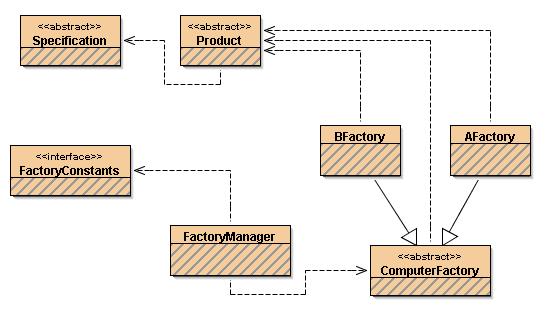Factories have been a key pattern in building applications, its fascinatingly simple, effective and to the point. When starting to learn a design oriented approach to applications or API, I would always recommend a factory pattern as one of the key starting notes of highlight in your design.
So today I am talking about the Abstract Factory pattern. Its not an “abstract” class or object that you call a pattern. But its a Factory of facotries and that is what exactly makes it so much wordingly abstract. Having “abstract” classes is there but just some other side of the coin.
When should I use an Abstract Factory:
- Independence of how products are created, composed or represented
- You need enforcable constraints for the products used as a group
- You need to reveal only the interfaces of products and not thier implementation as part of a bigger picture.
So lets begin with the fun.
This is how I plan to implement it: Has A:
- Product has a Specification
- Factory has a Product
- FactoryManager has FactoryConstants
- FactoryManager has ComputerFactory
Is A:
- BFactory is a ComputerFactory
- AFactory is a ComputerFactory
Not shown.
- ProductA is a Product
- ProductB is a Product
Diagram

Creating a simple factory that returns products.
public abstract class ComputerFactory {
public abstract String getName();
public abstract Product[] getProducts();
public abstract Product getProduct(int ProductID);
}
Implementation of the ComputerFactory
public class AFactory extends ComputerFactory {
public String getName(){
return "A";
}
public Product[] getProducts(){
return null;
}
public Product getProduct(int productID){
switch(productID){
case 1:
return new ProductA();
case 2:
return new ProductB();
default:
throw new IllegalArgumentException("Sorry you hit the wrong factory, we closed down in 1600 BC");
}
}
}
A register base for factories. Refer to the main method for use later in this post.
public interface FactoryConstants {
public int A = 1;
public int B = 2;
}
The main Entrant class. the Factory Manager that will give the ComputerFactory resultant. Its assumed to be a Singleton as it registers as a Creator in the system (assumption).
public class FactoryManager{
private static FactoryManager factoryManager = null;
private FactoryManager(){}
public static FactoryManager getInstance(){
if(factoryManager != null){
return factoryManager;
}
else return factoryManager = new FactoryManager();
}
public ComputerFactory getFactory(int factory) throws IllegalArgumentException{
switch(factory){
case FactoryConstants.A:
return new IBMFactory();
case FactoryConstants.B:
return new SUNFactory();
default:
throw new IllegalArgumentException("Sorry you hit the wrong factory, we closed down in 1600 BC");
}
}
}
A main method to test the AbstractFactory
public static void main(String args[]){
System.out.println(FactoryManager.getInstance().getFactory(FactoryConstants.A).getName());
System.out.println(FactoryManager.getInstance().getFactory(FactoryConstants.B).getName());
System.out.println(FactoryManager.getInstance().getFactory(3).getName());
}
You can find the complete code listing here